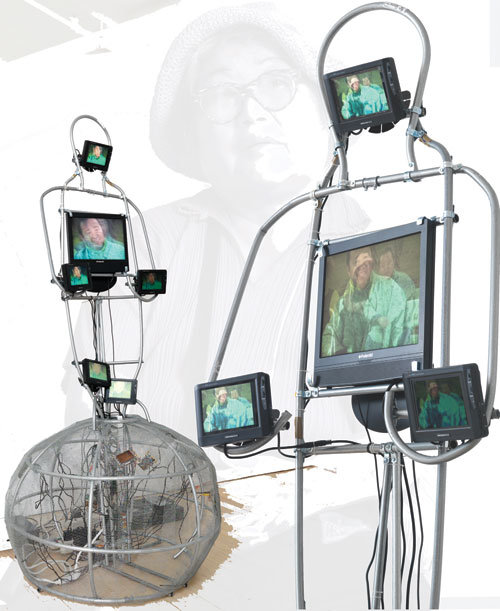Shigeko Kubota
dal 5/9/2007 al 19/10/2007
Segnalato da
5/9/2007
Shigeko Kubota
Stendhal Gallery, New York
My Life With Nam June Paik.

Shigeko Kubota
My Life With Nam June Paik
Maya Stendhal Gallery is pleased to present a solo show of pioneering
video sculptor and multimedia artist Shigeko Kubota titled My Life With
Nam June Paik, which runs from September 6 through October 20, 2007. As
one of the first artists to explore the aesthetic, emotive, and
technological properties of video, Kubota is largely responsible for
video's acceptance as a legitimate art form. Her early video sculptures
and performances broke new ground for women artists during the feminist
art movement of the late 1960's and 1970's. On view are key works, some
never before exhibited, which disclose Kubota's important contributions
to contemporary art practice. At the same time, these works highlight
the artist's special relationship with husband and collaborator Nam June
Paik (1932-2006).
The autobiographical is a constant theme throughout Kubota's impressive
body of work. She unites traditional sculpture with the electronic image
to convey the personal, spiritual, and creative aspects that motivate
her in life and in art.
Conceived of as one video environment, the exhibition presents a
landscape of Kubota's magical video sculptures, which at once disorients
and transfixes the viewer. It is a dreamland filled with massive
crystalline mirror growths, dynamic metal sculptures, and video screen
projections that pulsate colorfully like living organisms. Kubota
describes the sculptures as a means of communication with another world.
Jonas Mekas, Kubota's longtime friend and collaborator, encapsulates the
essence of this monumental show:
"So it's time that we see Shigeko Kubota as an artist, a supreme artist
in the art she was so crucial in assisting. Her video/electronic
sculptures have been so rarely seen in public. Their modernity, their
energy, their impact upon one's entire sensory and mental body is
electrifying. I can only try to imagine, and it's not so easy to do,
Shigeko Kubota's contribution to her life's friend, Nam June Paik.
It must have been immense."
The show presents two new, larger than life sculptures that will be
unveiled to the public for the first time. Nam June Paik I (2007)
assumes a ghost-like form. Composed of metal piping, the work
abstractly suggests a human figure sitting on a mesh, orb-like base.
The figure comes to life as recent images of Kubota and Paik in Miami
play on monitors stationed at the head, torso, hands, and knees. A
beautiful musical piece that Paik composed when he was thirteen emanates
from the work, lending an otherworldly air to this eccentric and
surprising environment. The imposing Buddha-like figure of Nam June Paik
II (2007) stretches out his arms, claiming control over this video
underworld. He is Paik reincarnated "simultaneously wearing suspenders
and a belt to indicate the eccentric personality for which he was known.
In one hand he holds a violin, the instrument he smashed in his
memorable performance One for Violin Solo. In the other hand is a
Buddha head, referencing his well-known work TV-Buddha. One senses that
the connection between Kubota and Paik remains strong as ever with this
piece. Touching footage of the couple shot over the years plays on 15
monitors placed throughout the torso, arms, and head. Created in memory
of Paik, these intimate works symbolize his enduring presence as a
husband and artist.
Born in 1937 in Niigata, Japan, Shigeko Kubota studied sculpture in her
native country before moving to New York City in 1964 where she met
George Maciunas, the influential founder of the Fluxus art movement.
She became an active figure, embracing the movement's collaborative and
experimental approach to artistic practice. Fluxus introduced her to
one of the group's core members Nam June Paik, and they eventually
married in 1977. The radical ideas and iconic imagery put forth by
artist Marcel Duchamp also motivated Kubota in theory and practice.
These influences, grounded in avant-garde beliefs, provided Kubota with
the creative push needed to break free from art's restrictive
boundaries, and in 1970, she began using video.
Shigeko Kubota has exhibited at major art museums all over the world
including the Museum of Modern Art, Whitney Museum of American Art,
Solomon R. Guggenheim Museum, and the New Museum of Contemporary Art in
New York, the Museum of Contemporary Art in Chicago, the Stedelijk
Museum in Amsterdam, and the Hara Museum of Contemporary Art in Tokyo.
She held artist residencies at the Art Institute of Chicago and Brown
University, and taught Video Art at the School of Visual Arts in New
York. She received the DAAD Fellowship in Berlin, Germany, and awards
and grants from the Solomon R. Guggenheim Museum, Rockefeller
Foundation, American Film Institute, New York Foundation for the Arts,
New York State Council on the Arts, and the National Endowment for the
Arts. Shigeko Kubota lives and works in New York City.
Opening:September 6, 6-9pm
Maya Stendhal Gallery
545 West 20th St. New York
Free Admission



